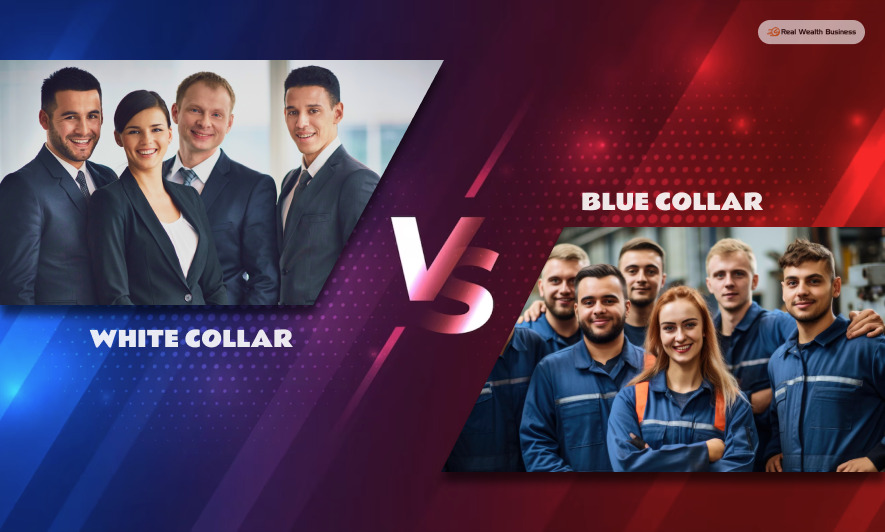White Collar Vs Blue Collar: What Is The Difference?
by Shahnawaz Alam Job & Career 22 August 2023

What are the different collar types in the job market? Human civilization has found different ways of defining things and broadly accepting them. Currency, language, and even jobs get classified under specific terms. The job market has additional professional terms that rank different professions.
One interesting way is to identify what type of job someone does by specifying their collar type job. For example, there are white, blue, pink, and black-collar types in the job market. But today, we will talk about Blue Collar and white-collar jobs.
People usually question the difference between two widely sought collar jobs – white and blue-collar jobs. Today, we will discuss white collar vs blue collar job differences.
Please go through this article to find out their differences.
What Are Blue Collar Jobs?

The blue-collar type of job refers to laborious jobs that require strenuous labor. Usually, manual laborers are classified under blue-collar jobs; in the 20th century, manual laborers used to wear clothes made out of resistant fabrics that were dark blue or black. You can also say that their clothes were darker in color.
Manual laborers usually wear this type of color to reduce the amount of stains or dirt on them. Blue color job workers cannot frequently afford to wash their job uniforms, hence the darker or bluish outfits while on the job. That is why manual laborers are classified under blue color jobs.
These individuals usually work in the industrial, agricultural, and construction industries.
What Are White Collar Jobs?

So, what is the difference between white collar vs blue collar? You can think of it like a Wall Street employee vs a construction worker. White collar job workers are office workers who work desk jobs and usually wear white collared shirts.
Higher managerial posts usually require a medium to high educational background, intellect, critical thinking, and many soft skills. White-collar workers include finance jobs, bank employees, administrative assistants, etc.
White Collar Vs Blue Collar: What Is The Difference?
You already understand the basic difference between blue-collar and white-collar jobs. However, delving deeper into their skills requirements, work environment, and requirements of intellectual or physical abilities will provide you with more insights.
Here are some differences worth noticing –
Work Environment
White-collar jobs have a different work environment compared to blue-collar jobs. In white-collar jobs, there is a typical corporate office setting, a desk, computer, books, journals, paper, etc. These workers usually wear formal white shirts and similar outfits fit for a corporate setting. A white collar employee usually travels abroad interacts with their clients in different environments like different social settings like boardrooms, restaurants, and conferences, etc.
The blue-collar workers have a completely different setting. They usually work in plantations, warehouses, workshops, factories, homes, etc. They often work behind the scenes and have to operate life-heavy equipment. This type of job usually requires craftsmanship, manual labor, etc.
Type Of Labor Needed
White-collar job workers do not need to perform heavy lifting. The labor needed here requires the jobbers to use their hands to type emails, get contracts signed, and solve critical problems using their mental and intellectual prowess.
On the other hand, the labor needed by a blue-collar jobber is purely manual. They have to spend their energy, strength, coordination, etc. On the other hand, the white-collar job requires employees to use their skills of communication, innovation, and creative skills to solve problems. They have to manage co-workers, develop new ideas, and meet the organizational goal.
A blue-collar job has a limitation in terms of the type of labor needed. A carpenter’s work can be diversified only to a certain extent. On the other hand, a marketer can come up with different creative ways of running a campaign.
Education
The education requirement has also defined the white-collar vs. blue-collar job difference.
White-collar jobs require professionals to have at least a high school degree and a bachelor’s degree. The higher the positions are, the greater the limit of educational qualification required. Also, job seekers with more credentials have more opportunities for higher pay in the white-collar job market.
A blue-collar job seeker requires on-the-job training from any formal or informal apprenticeship program. Some of the professionals usually take training from skilled workers. Also, certified blue-collar job workers who validate their skills through vocational programs get higher wages.
Payment
Both blue-collar jobs and white-collar job applicants require more experience and add more skills to their resumes to increase their pay. However, the white-collar vs. blue-collar job difference still pertains, thanks to the mode of their payment.
The white collar job employee has to work during the weekdays and from 9 to 5. The fixed work schedule for white-collar employees ensures their monthly salary via an annual employment program. On the other hand, the blue collar worker may get weekly, hourly, or monthly payments depending on their employment.
White Collar vs blue-collar jobs: Types Of jobs
Both types of workers get jobs in the same industry while functioning in different positions based on their skills and experiences. For example, there are bricklayers within a construction company. On the other hand, a white-collar engineer, architect, or human resource manager might also work in that industry.
White Collar Jobs
As a white-collar jobber, you will find the following skills –
- Technological innovation
- Health service providers,
- Accounting
- Consulting
- Marketing
- Law
- Software development
- Engineering
- Teaching
Blue Collar Jobs
- Retail
- Agriculture
- Manufacturing
- Landscaping
- Foodservice
- Construction
- Transportation & logistics
- Repair & maintenance
- Municipal services
- Cleaning and pest control
Final Words
The words like white collar, and blue collar are used to describe the job setting and the environment someone works under. This is one of the traditional ways of describing the differences in the work settings of two different professionals. Also, the white-collar vs. blue-collar job difference provides insight into the skills required in one’s job.
I hope that this article provided you with the difference you were looking for. Please let us know if you have any similar questions in mind. We will ensure to get back to you.
Read Also:







































































































